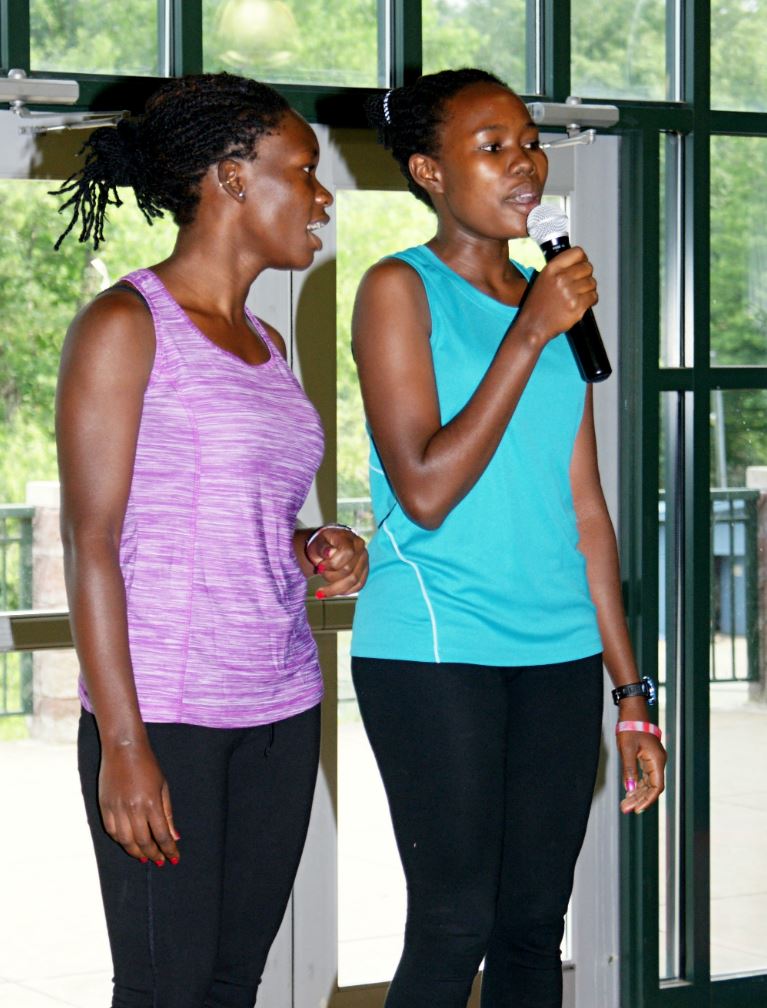A Jewish Journey from Uganda to URJ Camp Coleman (2015) - Kulanu (original) (raw)
Reprinted from the URJ Camp Coleman blog (http://coleman.urjcamps.org)

Rabbi Noam Katz, Shoshanna, Sarah, and others
Kol yisrael arevim zeh lazeh. This oft-quoted Talmudic teaching – “All of Israel is responsible, one to another” [1] – never resonated so deeply for me as when I said goodbye to family and friends in the winter of 2003-04, and set out on a three-month volunteer stint in, of all Jewish destinations, East Africa.
Nestled in the lush green Mbale region of Uganda lives an extraordinary Jewish community, known as the Abayudaya (“children of Judah” in the local dialect, Luganda). The Abayudaya trace their roots to 1919, when a regional chieftain named Semei Kakungulu adopted the beliefs and practices of Judaism after receiving a copy of the Torah translated into Luganda. Kakungulu was such an influential leader that no less than 3,000 people “converted” to Judaism [2], as he oversaw the construction of synagogues, schools and a communal center in his home on Nabugoye Hill. Following Kakungulu’s death in 1928, the Jewish population gradually began to dwindle, as few leaders emerged and Jewish practice was banned under the tyrannical reign of Idi Amin in the 1970s. However, following the overthrow of Amin’s government, a group of Abayudaya youth (not much older than our current NFTYites and URJ camp counselors) re-established their right to practice Judaism, committing themselves to Torah-centered lives consisting of prayer, mitzvot and ongoing Jewish learning.
Fascinated with their unique history and inspired by their beautiful Afro-Jewish melodies, I traveled thousands of miles to begin my volunteer work in early December 2003.[3] In addition to teaching English and Hebrew in their village schools, one of my major responsibilities was to organize the community’s fledgling youth group. Having grown up in NFTY-NEL and working on staff at URJ Eisner and Kutz Camps, I figured I was up to the challenge. But nothing could prepare me for this eye-opening experience. Laser tag and broomball were replaced by hikes to the top of a waterfall; sing-alongs in Hebrew and Luganda became an everyday occurrence; and an unbreakable spirit exuded from the smiles of every youth, despite the very real hardships they faced on a daily basis, including malaria, malnutrition and poverty.

Photo courtesy of Seth Jonadav
While these young Ugandan Jews all dazzled me with their enthusiasm and amazing ability to overcome adverse living conditions, a few stood out from their peers. Two of these impressive youngsters happened to be best friends: Shoshanna Nambi and Sarah Nabagala. Thirteen years old, they carried themselves with maturity, poise and impressively sharp intellect that was rare among most B’nai Mitzvah students I had met. Though neither stood higher than five feet, Shoshanna and Sarah seemed to tower over others in terms of leadership. Each possessed a gentle spirit, humility and a genuine desire to make a difference in the world. And what a difference they would make…
Fast forward 12 years. The first stop on my 2015 summer camp tour-in which I serve as a musician/educator-in-residence and help to train young songleaders-was URJ Camp Coleman in Cleveland, Georgia. I had seen my friend, director Bobby Harris, at NFTY Convention just months earlier, where he had mentioned his idea of bringing two members of the Abayudaya to serve as counselors at camp. It didn’t take much for him to get my overwhelming endorsement.
Upon walking into the chadar ochel, two young women greeted me with familiar smiles as if no time had passed. Shoshanna and Sarah, now impactful leaders in their home community, had brought their talents and gifts to Coleman for the summer. While adjusting to new surroundings and the rich culture of URJ camping, they were helping their own campers to see the richly diverse tapestry of global Jewry today.

Sarah and Shoshanna leading the camp in a song session (Photo courtesy of Arthur Glazer)
Though I have shared the stories and songs of the Abayudaya with numerous camps and congregations over the past decade, nothing felt quite like sharing the bimah with these two extraordinary souls. In front of an entranced group of campers and counselors, they sang their rendition of “Hinei Mah Tov,” spoke about growing up in Uganda, and discussed ways that North American Jews can engage with Abayudaya youth through tzedakah, travel and online communication. I mostly stood to the side, beaming with pride as I watched Sarah and Shoshanna show that same energy, that same indefatigable spirit, that had wowed me so many years ago.
What began as an interest in overseas volunteer work materialized into my own education about what it truly means to value and uplift one’s fellow Jew. Because of the audacious hospitality and inherent leadership exhibited by the Abayudaya, I was forever transformed. And now, Sarah and Shoshanna are transforming hundreds of young Jewish lives with their work at Camp Coleman.
Kol Yisrael arevim zeh lazeh, indeed.
______________________________________________
[1] Babylonian Talmud, Shavuot 39a.
[2] In 2002, a Beit Din comprised of four Conservative Rabbis from Israel and the U.S. convened an official conversion of several hundred Abayudaya Jews. Many of them considered it more of a religious “affirmation” than conversion, as they had grown up in Jewish households spanning three generations.
[3] My voluntarism was made possible, in part, by the support of two global-reaching Jewish organizations, Kulanu and American Jewish World Service.